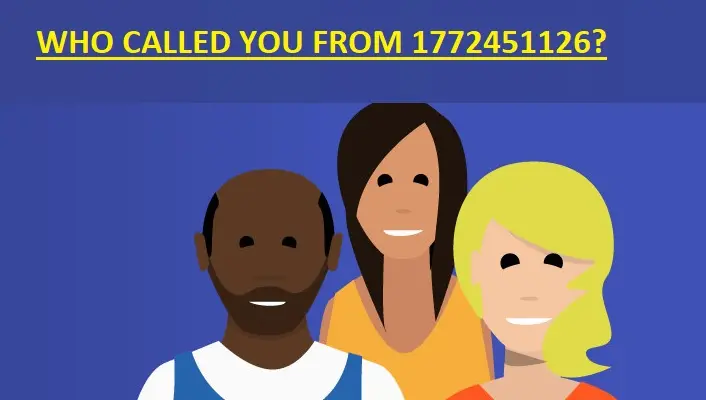
Receiving unexpected calls can be unsettling, especially when they come from unknown numbers like 01772451126. In the UK, phone scams are increasingly common, and it’s crucial to be vigilant. This article will explore who might be calling from 01772451126 and provide you with practical advice on identifying and preventing scams.
Understanding the Caller: 01772451126

When you receive a call from a number like 01772451126, your first instinct might be to ignore it or wonder who it could be. This number has been reported by many people in the UK as potentially linked to scam activities. These calls can range from fake offers and prize wins to more serious attempts to extract personal information or money.
Common Types of Phone Scams in the UK
Phone scams come in various forms, and understanding them can help you recognize a scam when you encounter one. Here are some common types of phone scams in the UK:
1. Phishing Scams
Scammers pretend to be from legitimate organizations, such as banks, to trick you into giving away personal information like your bank account or credit card details.
2. Tech Support Scams
You receive a call claiming that your computer has a virus, and the caller offers to fix it for a fee. They may ask for remote access to your computer, which can lead to further security breaches.
3. Prize or Lottery Scams
These scams claim that you’ve won a prize or lottery you never entered. To claim your prize, you are asked to pay a fee or provide personal details.
4. Investment Scams
Scammers offer investment opportunities that promise high returns with little risk. Once you invest, the scammer disappears with your money.
5. HMRC Scams
Scammers impersonate HM Revenue and Customs, claiming you owe tax and will be arrested if you don’t pay immediately.
How to Identify a Scam Call
Identifying scam calls is crucial to protecting yourself. Here are some red flags to watch out for:
- Unexpected Calls: Be wary of calls from unknown numbers that you weren’t expecting.
- Pressure Tactics: Scammers often create a sense of urgency, pressuring you to make quick decisions.
- Requests for Personal Information: Legitimate organizations will not ask for sensitive information like passwords or PINs over the phone.
- Too Good to Be True Offers: Be skeptical of offers that seem too good to be true, such as winning a lottery you didn’t enter.
- Unprofessional Behavior: Poor grammar, spelling mistakes, and unprofessional language can indicate a scam.
Steps to Take if You Receive a Scam Call

If you receive a call from 01772451126 or any other suspicious number, follow these steps to protect yourself:
1. Do Not Engage
Hang up immediately. Engaging with the scammer can increase your risk of being targeted further.
2. Verify the Caller
If the caller claims to be from a legitimate organization, hang up and call the organization directly using a number you trust to verify the claim.
3. Report the Call
Report the scam call to the relevant authorities. In the UK, you can report phone scams to Action Fraud, the national fraud and cybercrime reporting center.
4. Block the Number
Use your phone’s settings to block the number to prevent further calls from that number.
5. Be Cautious with Personal Information
Never give out personal or financial information over the phone unless you are certain of the caller’s identity.
What to Do if You Fall Victim to a Scam
If you have fallen victim to a scam, it’s important to act quickly to mitigate the damage:
1. Contact Your Bank
If you have given out your bank details or made a payment, contact your bank immediately to inform them of the scam. They can help protect your account and potentially recover lost funds.
2. Change Your Passwords
Change the passwords of any accounts that may have been compromised. Use strong, unique passwords for each account.
3. Monitor Your Accounts
Keep a close eye on your bank and online accounts for any suspicious activity. Report any unauthorized transactions to your bank.
4. Report the Scam
Report the scam to Action Fraud and any other relevant authorities. This can help prevent others from falling victim to the same scam.
Protecting Yourself from Future Scams

Prevention is the best defense against scams. Here are some tips to protect yourself from future scams:
1. Be Skeptical
Always be skeptical of unexpected calls, especially those requesting personal information or money.
2. Educate Yourself
Stay informed about common scam tactics and warning signs. The more you know, the better prepared you’ll be to recognize a scam.
3. Use Call Blocking Features
Take advantage of call-blocking features offered by your phone provider or use a call-blocking app to filter out potential scam calls.
4. Register with the TPS
Register your phone number with the Telephone Preference Service (TPS) to reduce the number of marketing calls you receive. While this won’t block all scam calls, it can help reduce the overall volume.
5. Be Cautious Online
Be cautious about sharing your phone number online. Scammers often harvest phone numbers from online sources.
The Role of Technology in Combating Scams
Technology plays a significant role in both facilitating and combating scams. While scammers use technology to reach potential victims, there are also many technological tools available to help protect yourself:
1. Caller ID and Call Blocking
Most smartphones and landlines come with caller ID and call-blocking features. Use these tools to screen calls and block suspicious numbers.
2. Anti-Scam Apps
There are several apps available that can help identify and block scam calls. Apps like Truecaller and Hiya use databases of known scam numbers to alert you to potential scams.
3. Security Software
Ensure your computer and smartphone are protected with up-to-date security software. This can help prevent malware and phishing attacks.
4. Two-Factor Authentication (2FA)
Enable two-factor authentication on your online accounts. This adds an extra layer of security, making it harder for scammers to gain access.
Helpful Resources and Links
To further educate yourself and stay protected, consider using the following resources:
- Action Fraud: Action Fraud is the UK’s national reporting center for fraud and cybercrime.
- Which? Consumer Rights: Which? offers advice on recognizing and dealing with scams.
- Citizen’s Advice: Citizen’s Advice provides information on how to deal with phone scams.
- Ofcom: Ofcom offers advice on protecting yourself from phone scams and nuisance calls.
01772451126 Who Called Me?

Let’s take a closer look at the specific number 01772451126. Many people in the UK have reported receiving calls from this number. The nature of these calls varies, but common themes include:
- Silent Calls: The caller hangs up when you answer.
- Automated Messages: Recorded messages claiming you owe money or need to take urgent action.
- Suspicious Offers: Promises of prizes or investments that require your personal information.
If you’ve received a call from 01772451126, it’s essential to treat it with caution. Follow the steps outlined above to verify the caller and protect yourself from potential scams.
Conclusion
Phone scams are a growing concern in the UK, and numbers like 6463276197 are often reported as part of these scams. By staying informed and vigilant, you can protect yourself from falling victim to these schemes. Remember to report any suspicious calls to the authorities and use the tools and resources available to safeguard your personal information. Stay safe and alert, and help spread awareness to protect others from phone scams.
FAQs
What should I do if I receive a call from 01772451126? If you receive a call from 01772451126, do not engage with the caller. Hang up immediately and block the number. Report the call to Action Fraud to help protect others.
How can I protect myself from phone scams? Protect yourself by being skeptical of unexpected calls, not sharing personal information over the phone, and using call-blocking features. Educate yourself about common scam tactics.
What is Action Fraud, and how do I report a scam? Action Fraud is the UK’s national reporting center for fraud and cybercrime. You can report scams by visiting their website or calling their helpline.
Are there apps to help identify scam calls? Yes, there are several apps, such as Truecaller and Hiya, that can help identify and block scam calls. These apps use databases of known scam numbers to alert you.
Can registering with the Telephone Preference Service (TPS) stop scam calls? Registering with the TPS can reduce the number of marketing calls you receive but may not block all scam calls. It’s still important to be cautious and use call-blocking features.
What should I do if I fall victim to a scam? If you fall victim to a scam, contact your bank immediately, change your passwords, monitor your accounts for suspicious activity, and report the scam to Action Fraud.
